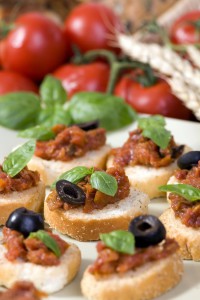
A recent groundbreaking cancer study conducted by the National Institutes of Health tracked the eating habits of more than half a million older Americans over a 15-year period and found that what we eat can have a profound effect on cancer risk. While study participants were age 50 and older, cancer treatment experts feel the nutritional findings are applicable to people of all ages.
The study found a marked decrease in cancer and heart disease in people who ate what is considered a Mediterranean diet: a diet rich in vegetables, beans, fruits, nuts, whole grains, olive oil and fish but low in red meat, processed meat and saturated fats. In comparing dietary choices to cancer incidence, researchers also discovered some interesting associations with specific foods:
- Women who drank more than three cups of caffeinated coffee daily decreased their risk of endometrial cancer by 35%.
- Coffee drinkers of both sexes who drank at least 4 cups of either regular or decaf coffee daily reduced their risk of colon cancer.
- Blueberries and other antioxidant-rich berries offer protection against mouth and neck cancers.
- Breads and pastas made from 100% whole grains decrease colon cancer risk.
- Lycopene-rich tomatoes, both whole and in sauces, help protect against prostate cancer.
- Consumption of alcohol at any level increases the risk of breast cancer.
- High alcohol consumption increases the risk of colon and liver cancer for both men and women.
Making healthy food choices that support a strong immune system may help decrease cancer risk and support the effectiveness of cancer treatments should cancer strike.
